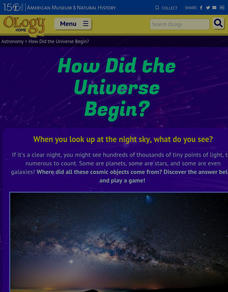Curated OER
Looking At Illuminated Manuscripts: A Book Of Modern Astronomy
Students examine a medieval manuscript on astronomy and create their own books based on modern discoveries in astronomy. They choose a subject of modern astronomy that they would like to write and create an illuminated image about.
Curated OER
Exploring the Sky: Reading Maria's Comet
Discover the science behind astronomy. After reading the book Maria's Comet, which is about a young woman who breaks new ground by becoming a female astronomer, young learners practice reading comprehension with...
Curated OER
Astronomy
Young scholars examine a medieval manuscript on astronomy and create their own books based on modern discoveries in astronomy. In this astronomy activity, students compare astronomy knowledge in the middle ages to today and research...
Curated OER
Islamic Scientific Contributions to Civilization
Seventh graders explore several well documented artistic and scientific accomplishments that were discovered or perfected during The Golden Age of Islam. They are staff writers of a magazine who create a feature article about a topic...
Curated OER
Deep Impact's Comet on a Stick!
Learners create a model of a comet. In this space science lesson, students compare their model to the characteristics of a real comet. They evaluate and make necessary modifications to their original design.
American Museum of Natural History
How Did the Universe Begin?
The Big Bang Theory is more than a television show. Pupils read how Edwin Hubble observed other galaxies and noticed that the galaxies are moving away from each other. Scholars learn about the idea of the big bang and what happened next...
Curated OER
Uranus, Neptune, and Pluto
In this planets worksheet, students read information about Uranus, Neptune, and Pluto and then complete 18 multiple choice, 4 true or false, and 2 fill in the blank questions.
Smithsonian Institution
National Air and Space Museum: Exploring the Planets: Early Discovery
This section of the exhibition gives the history of the discovery and study of space starting with the Greeks and Romans through to the early 1900's.
Wikimedia
Wikipedia: The Black Hole
This site examines the black hole as an object in astrophysics. Delve into this comprehensive resource that covers this concept from its history, to qualitative physics, the reality of black holes, mathematical physics and more.










